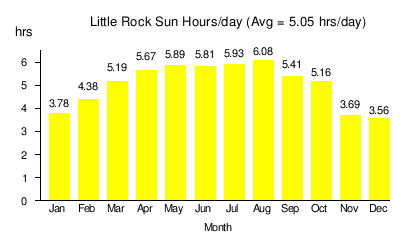Solar power in Arkansas

Solar power in Arkansas on rooftops can provide 33.3% of all electricity used in Arkansas from 12,200 MW of solar panels.[1]
Net metering is available to all residential consumers up to 25 kW and 300 kW for non-residential users, but is lost once a year at the end of the 12 month billing cycle, which needs to be in the spring to avoid losing excess summer generation.[2] IREC best practices, based on experience, recommends no limits to net metering, individual or aggregate, and perpetual roll over of kWh credits.[3] A rebate program is available for systems up to 25 kW that pays $1.50/kWh generated during the first year of operation.[4] A 5 kW system, costing $17,500 after receiving a 30% federal tax credit, would produce about 6484 kWh/year, providing a rebate of approximately $9,726. The federal tax credit is available through 2021.[5]

In 2010 the Fayetteville Public Library installed a 13.5 kW solar array,[6] and received a rebate for the 20,547 kWh generated of $30,821.10.[7]
The largest company in Arkansas, and occasionally the world,[8] Walmart, set a goal in 2005 of being powered 100% by renewable energy. By April 2012 they were generating 4% locally, mainly from rooftop solar panels, and overall using 22% renewable energy.[9]
Statistics

|
| Year(s) | Capacity | Installed | % Change |
|---|---|---|---|
| 2009 | 0.2 | 0.2 | |
| 2010 | 1.0 | 0.6 | 400% |
| 2011 | 1.1 | 0.1 | 10% |
| 2012 | 1.5 | 0.6 | 55% |
| 2013 | 1.8 | 0.2 | 13% |
| 2014 | 3.8 | 2 | 111% |
| 2015 | 20.1 | 16.3 | 429% |
| 2016 | 24.1 | 4 | 19.9% |
| 2017 | 30.1 | 6 | 24.9% |
| 2018 | 180 | 170.9 | 498% |
| 2019 | 220 | 40 | 22.2% |
| 2020 | 381.1 | 161.1 | 73.2% |
| 2021 | 553.4 | 172.3 | % |
| 2022 | 632 | 78.6 | % |
| Year | Total | Jan | Feb | Mar | Apr | May | Jun | Jul | Aug | Sep | Oct | Nov | Dec |
|---|---|---|---|---|---|---|---|---|---|---|---|---|---|
| 2015 | 1 | 0 | 0 | 0 | 0 | 0 | 0 | 0 | 0 | 0 | 0 | 0 | 1 |
| 2016 | 26 | 1 | 2 | 2 | 2 | 2 | 2 | 3 | 2 | 3 | 3 | 2 | 2 |
| 2017 | 31 | 1 | 2 | 3 | 3 | 3 | 3 | 3 | 3 | 3 | 3 | 2 | 2 |
| 2018 | 205 | 13 | 9 | 20 | 20 | 23 | 23 | 22 | 22 | 16 | 15 | 12 | 10 |
| 2019 | 209 | 11 | 9 | 17 | 18 | 20 | 21 | 25 | 24 | 22 | 17 | 14 | 11 |
| 2020 | 274 | 11 | 14 | 14 | 19 | 25 | 24 | 25 | 24 | 28 | 33 | 32 | 25 |
| 2021 | 328 | 24 | 20 | 39 | 45 | 49 | 49 | 52 | 50 |
See also
References
- ^ Rooftop Solar Photovoltaic Technical Potential in the United States: A Detailed Assessment
- ^ Freeing the grid
- ^ Net Metering and Interconnection Procedures Incorporating Best Practices
- ^ Renewable Technology Rebate Fund Archived June 16, 2012, at the Wayback Machine
- ^ US Department of Energy. "RESIDENTIAL RENEWABLE ENERGY TAX CREDIT". energy.gov. Retrieved 5 March 2016.
- ^ Fayetteville Public Library
- ^ Green Energy Production Produces Sizeable Rebates
- ^ List of Companies with Highest Income/Revenue
- ^ Just how far along is Walmart on its sustainability journey?
- ^ "PV Watts". NREL. Retrieved 11 June 2012.
- ^ Sherwood, Larry (August 2012). "U.S. Solar Market Trends 2011" (PDF). Interstate Renewable Energy Council (IREC). Archived from the original (PDF) on 2012-09-06. Retrieved 2012-08-16.
- ^ Sherwood, Larry (June 2011). "U.S. Solar Market Trends 2010" (PDF). Interstate Renewable Energy Council (IREC). p. 20. Retrieved 2011-06-29.
- ^ Sherwood, Larry (July 2010). "U.S. Solar Market Trends 2009" (PDF). Interstate Renewable Energy Council (IREC). p. 23. Archived from the original (PDF) on 2010-09-25. Retrieved 2010-07-28.
- ^ Sherwood, Larry (July 2009). "U.S. Solar Market Trends 2008" (PDF). Interstate Renewable Energy Council (IREC). p. 16. Archived from the original (PDF) on 2009-11-23. Retrieved 2010-07-24.
- ^ Sherwood, Larry (July 2012). "U.S. Solar Market Trends 2012" (PDF). Interstate Renewable Energy Council (IREC). p. 16. Retrieved 2013-10-11.
- ^ Sherwood, Larry (July 2014). "U.S. Solar Market Trends 2013" (PDF). Interstate Renewable Energy Council (IREC). Retrieved 2014-09-26.
- ^ Arkansas Solar
- ^ "Electricity Data Browser". U.S. Department of Energy. March 28, 2018. Retrieved October 11, 2021.
